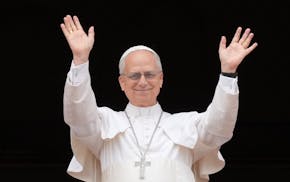To Martha Higuera, a St. Paul mom and early childhood teacher, voting "Yes" Nov. 5 on the proposal to boost child care funding with a hike of the city's property taxes is a pretty straightforward deal.
"The ballot initiative is a no-brainer," said Higuera, who has watched as the cost of child care has kept it out of reach for some of the neediest families. "As a resident, I will happily pay. It's the right thing to do."
Many opponents of the measure, including St. Paul Mayor Melvin Carter, agree that child care assistance is needed for the city's most economically challenged families. They disagree, however, that St. Paul property taxes should be used to do it. St. Paul property owners already have the highest tax burden in the state, Summit Avenue resident Gary Todd said.
"Financially, I don't think it makes sense. And from a budgetary standpoint, it just doesn't make sense for the city to take this on," Todd said. "And it's doubtful that it would solve the issues that it's intended to solve."
The ballot question will ask voters to approve a property tax levy increase that would be distributed as subsidies to low-income families and child care providers. The St. Paul City Council voted in August 2023 to override Carter's veto of the proposal, putting it on the November ballot.
According to the Vote Yes for St. Paul Families campaign, if voters approve, they would create Minnesota's first dedicated early learning fund and get hundreds of children off child care waitlists and help more of them start school ready to learn. More than 5,000 St. Paul children under the age of 5 live in poverty, advocates of the proposal say.
Tax increase for subsidies
The ballot question will ask voters whether St. Paul should raise property taxes by $2 million a year, compounding annually, until $20 million a year is levied in the 10th year. That money would be used as subsidies for families, augmenting existing state and federal aid and philanthropy, said Rebecca Noecker, a St. Paul City Council member and longtime proponent of the proposal.
"We fill the gaps," Noecker said. "The goal here is to be part of the solution, not the only answer."
According to program details given to the City Council in September, 27% of St. Paul children live under the federal poverty level, $31,200 for a family of four. More than half live under 185% of the federal poverty level — a threshold used by the state to indicate the need for early learning scholarships. The committee formulating the St. Paul plan recommends covering the full cost of care for children under 185% of the poverty level.
In the program's first year, the subsidies would likely help cover child care for 154 infants from some of St. Paul's neediest families, according to estimates. By the 10th year, 650 infants, 1,169 toddlers and 1,096 preschoolers would be receiving child care subsidies, organizers said.
Noecker said 4,000-7,000 children up to age 5 will have been helped over the 10 years.
Fifty other cities across the country have voter-approved children's funds, Noecker said, "And they've seen a lot of success."
According to "Vote Yes" organizers, the average St. Paul home would pay an additional $16 in the first year, less than $2 extra per month. After the 10th year, when the program is fully funded, the average home would pay an extra $160 each year.
Records filed with Ramsey County show that, as of Sept. 10, the Vote Yes campaign has raised $65,380 and spent $26,880.20. The campaign had an account balance of $38,639.80.
Mayoral opposition
Jennifer Lor, a Carter spokeswoman, said earlier this week that the mayor is preparing to release a letter outlining his opposition to the ballot measure and planned a media briefing. However, she said Wednesday, it was unlikely his response would come before next week.
Since his veto last year, Carter said he's concerned about the proposal's feasibility, fiscal impacts and legality. He has directed city staff not to work on anything related to the child care measure on city time. He has also said it would compete with parks, libraries, police and firefighters for limited city resources.
Jane Prince, a former City Council member who represented the East Side, said more affordable child care is desperately needed. But, she said, she cannot support this proposal unless the City Council shaves Carter's total requested levy increase by 1% to 2%.
"It's time for this council to hold this mayor accountable for his record of excessive staff and property tax increases," Prince said in a text message.
Higuera, who works in early intervention with children from birth to age 3 and is mother to a 7-year-old and a 10-year-old, said the need for child care is too great for voters not to act. Many families who need the help must wait a year or more, she said. Others never get it.
This vote, she said, "can be the difference between one kid who can afford [care] and one who misses this an opportunity because they can't afford it."

Trump reportedly is set to accept a jet from Qatar's ruling family for possible use as Air Force One

Pope Leo XIV calls for peace in Ukraine and Gaza in symbolically rich blessing on Mother's Day

Arson caused fire that engulfed WWII buildings in Arden Hills, fire department says
Body of canoer found in Boundary Waters

